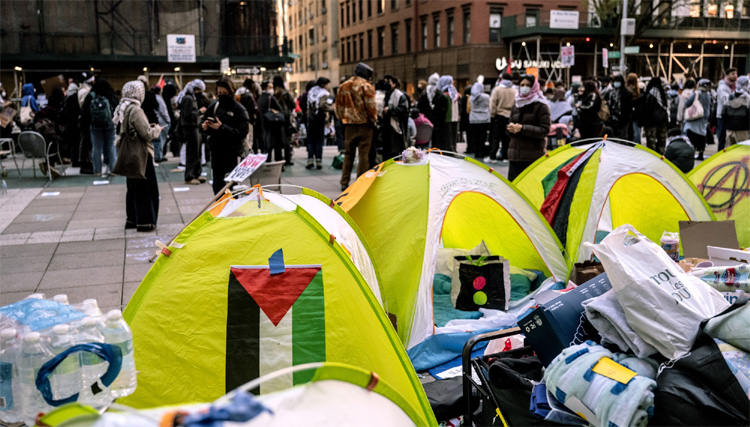Harvard protests mount as tensions spread over Israel-Hamas
Students at Harvard University escalated their campus protests over the Israel-Hamas conflict, mirroring actions that have erupted at Columbia, Yale and NYU.
Hundreds of Harvard affiliates gathered on Wednesday to demonstrate against the suspension of the Palestine Solidarity Committee, with some flooding into Harvard Yard from their dorms while cheering and putting up tents.
The protests, spanning colleges from the University of Michigan to University of California at Berkeley, have centered on calls for the schools to sever financial ties with companies linked to Israel and for the US to end military aid, as well as demands that administrations stop pursuing disciplinary action against students.
University officials have been trying to walk the tightrope between upholding free speech and maintaining order, with some resorting to arrests and the dismantling of protest encampments.
On Wednesday, hundreds of University of Texas at Austin students walked out in protest but were met by dozens of state troopers in riot gear who demanded they disperse, according to the Dallas Morning News. The troopers were seen arresting some students. Princeton sent a note warning students that anyone involved in an encampment or occupation who refuses to stop will be “arrested and immediately barred from campus.”
Columbia University has become a flashpoint in the disruptions facing higher education given the polarization on campuses over the Israel-Hamas war.
The demonstrations follow President Minouche Shafik’s congressional testimony last week in which she defended actions she said the school was taking to protect Jewish students. US Representative Elise Stefanik, a New York Republican, criticized Shafik’s leadership of the university and called for her resignation. Meanwwhile, faculty and students were outraged after she sent in the police and more than 100 arrests were made.
Lawmakers from both parties continue to focus on the strife. Republican House Speaker Mike Johnson visited Columbia on Wednesday to meet with Jewish students and deliver remarks on what his office called the “troubling rise of virulent antisemitism on America’s college campuses.” Johnson, speaking while overlooking the Columbia encampment, said if threats continue it may be appropriate for President Joe Biden to call in the National Guard.
“We can’t allow this kind of hatred and antisemitism to flourish and we must stop it in its tracks,” Johnson said, as some students booed and chanted pro-Palestinian slogans.
In an April 23 statement, Shafik said she supports free speech and recognized that many students were protesting peacefully but warned she would have to consider “alternative options” for clearing the encampment if talks weren’t successful.
With the end of the semester nearing and protests continuing, Columbia gave faculty the option to move classes to a hybrid format, allowing students to finish their courses remotely and avoid having to walk through parts of the campus where tensions are running high.
Other schools have faced similar disruptions.
At Yale, police arrested 60 people including 47 students Monday. President Peter Salovey cited “police reports identifying harmful acts and threatening language used against individuals at or near the protest sites.”
Elsewhere in New York City, a group of about 350 New York University students and others gathered in Washington Square Park to protest Israel’s conduct of the war and the school’s handling of the protests. Police arrested more than 100 people this week camped out at a plaza near the university’s business school.
Vendors sold Palestinian flags and keffiyehs from carts in the park.
A few blocks north, a group of about 50 people protested at the New School’s Greenwich Village campus, calling on the institution to divest its interests with ties to Israel.
The protests, occurring around the Jewish holiday of Passover, have also drawn condemnation from the White House and university donors. They have also raised concerns about the use of hard-line tactics by schools against students, and threats against Jewish students by protesters.
At some protests at schools, the debate has frequently devolved into harassment and threats, with some demonstrators at Columbia chanting “go back to Poland!” at Jewish students.
At the Massachusetts Institute of Technology, the Israel Alliance student group cited “significant fear among the Jewish community” given the events on other campuses, and moved the location of its traditional Passover Seder.
Broadly, campus protesters say their goal is to draw attention to humanitarian concerns in Gaza after Hamas militants stormed into Israel on Oct. 7, killing 1,200 people and taking scores of hostages, a move that sparked a counterattack by Israeli forces.
About 34,000 Palestinians, mostly civilians, have been killed as part of that response, according to the health ministry run by Hamas, which is designated a terrorist organization by the US government.


Comments are closed.